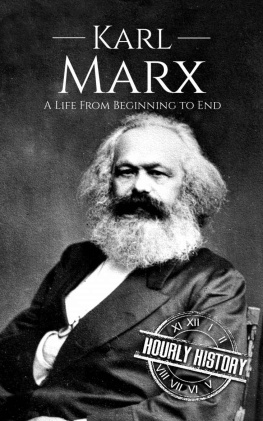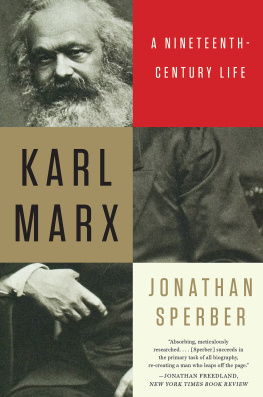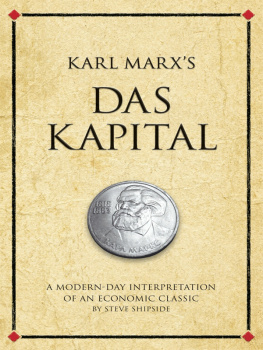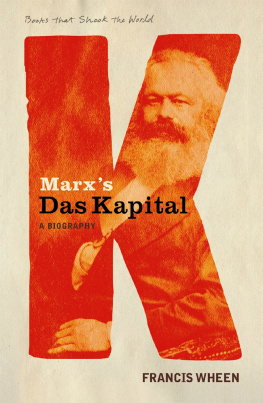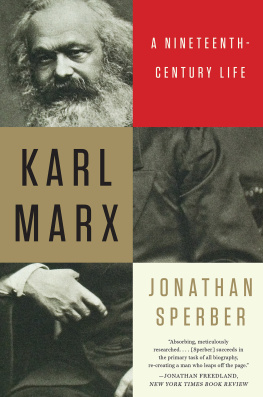
For Julia
There were only eleven mourners at Karl Marxs funeral on 17 March 1883. His name and work will endure through the ages, Friedrich Engels predicted in a graveside oration at Highgate cemetery. It seemed an unlikely boast, but he was right.
The history of the twentieth century is Marxs legacy. Stalin, Mao, Che, Castro the icons and monsters of the modern age have all presented themselves as his heirs. Whether he would recognise them as such is quite another matter. Even in his lifetime, the antics of self-styled disciples often drove him to despair. On hearing that a new French party claimed to be Marxist, he replied that in that case I, at least, am not a Marxist. Nevertheless, within one hundred years of his death half the worlds population was ruled by governments that professed Marxism to be their guiding faith. His ideas have transformed the study of economics, history, geography, sociology and literature. Not since Jesus Christ has an obscure pauper inspired such global devotion or been so calamitously misinterpreted.
It is time to strip away the mythology and try to rediscover Karl Marx the man. There have been thousands of books about Marxism, but almost all have been written by academics and zealots for whom it is a near-blasphemy to treat him as a figure of flesh and blood a Prussian migr who became a middle-class English gentleman; an angry agitator who spent much of his adult life in the scholarly silence of the British Museum Reading Room; a gregarious and convivial host who fell out with almost all his friends; a devoted family man who impregnated his housemaid; and a deeply earnest philosopher who loved drink, cigars and jokes.
For the West, during the Cold War, he was the demonic begetter of all evil, the founder of an awesomely sinister cult, the man whose baleful influence must be suppressed. In the Soviet Union of the 1950s he assumed the status of a secular God, with Lenin as John the Baptist and, of course, Comrade Stalin himself as the redeeming Messiah. This alone has been quite enough to convict Marx as an accomplice in the massacres and purges: had he lived a few years longer, by now some enterprising journalist would probably have fingered him as a prime suspect in the Jack the Ripper murders too. But why? Marx himself certainly never asked to be included in the Holy Trinity, and would have been appalled by the crimes committed in his name. The bastard creeds espoused by Stalin, Mao or Kim Il Sung treated his work rather as modern Christians use the Old Testament: much of it simply ignored or discarded, while a few resonant slogans (opium of the people, dictatorship of the proletariat) are wrenched out of context, turned upside down and then cited as apparently divine justification for the most brutal inhumanities. Kipling, as so often, had the right phrase:
He that has a Gospel
To loose upon Mankind,
Though he serve it utterly
Body, soul and mind
Though he go to Calvary
Daily for its gain
It is his Disciple
Shall make his labour vain.
Only a fool could hold Marx responsible for the Gulag; but there is, alas, a ready supply of fools. In one way or another, the most important facts of our time lead back to one man Karl Marx, Leopold Schwarzschild wrote in 1947, in the preface to his splenetic biography The Red Prussian. It will hardly be disputed that it is he who is manifested in the very existence of Soviet Russia, and particularly in the Soviet methods. The resemblance between Marxs methods and those of Uncle Joe Stalin was apparently so indisputable that Schwarzschild did not bother to adduce any evidence for his preposterous assertion, contenting himself with the observation that the tree is known by its fruit which, like so many proverbs, is rather less axiomatic than it sounds. Should philosophers be blamed for any and every subsequent mutilation of their ideas? If Herr Schwarzschild found wasp-eaten windfalls in his orchard or, perhaps, was served an overcooked apple pie for lunch did he reach for an axe and administer summary justice to the guilty tree?
Just as halfwitted or power-hungry followers deified Marx, so his critics have often succumbed to the equal and opposite error of imagining him as an agent of Satan. There were times when Marx seemed to be possessed by demons, writes a modern biographer, Robert Payne. He had the devils view of the world, and the devils malignity. Sometimes he seemed to know that he was accomplishing works of evil. This school of thought more of a borstal, really reaches its absurd conclusion in Was Karl Marx a Satanist?, a bizarre book published in 1976 by a famous American hot-gospeller, the Reverend Richard Wurmbrand, author of such imperishable masterpieces as Tortured for Christ (over two million copies sold) and The Answer to Moscows Bible.
According to Wurmbrand, the young Karl Marx was initiated into a highly secret Satanist church which he then served faithfully and wickedly for the rest of his life. No proof can be found, of course, but this merely strengthens the dog-collared detectives hunch: Since the Satanist sect is highly secret, we have only leads about the possibilities of his connections with it. What are these leads? Well, when he was a student Marx wrote a verse-play whose title, Oulanem, is more or less an anagram of Emanuel, the biblical name for Jesus and thus reminds us of the inversions of the Satanist black mass. Most incriminating; but theres more to come. Have you ever wondered, Wurmbrand asks, about Marxs hairstyle? Men usually wore beards in his time, but not beards like this Marxs manner of bearing himself was characteristic of the disciples of Joanna Southcott, a Satanic priestess who considered herself in contact with the demon Shiloh. In fact, the England inhabited by Marx had plenty of bushy-bearded gents, from the cricketer W. G. Grace to the politician Lord Salisbury. Were they, too, on speaking terms with the demon Shiloh?
After the end of the Cold War and the apparent triumph of God over Satan, countless wiseacres declared that we had reached what Francis Fukuyama smugly called the End of History. Communism was as dead as Marx himself, and the blood-curdling threat with which he concluded the Communist Manifesto, the most influential political pamphlet of all time, now seemed no more than a quaint historical relic: Let the ruling classes tremble at a communistic revolution. The proletarians have nothing to lose but their chains. They have a world to win. Working men of all countries, unite! The only fetters binding the working class today are mock-Rolex watches, but these latter-day proletarians have much else which theyd hate to lose microwave ovens, holiday timeshares and satellite dishes. They have bought their council houses and their shares in privatised utilities; they made a nice little windfall when their building society turned into a bank. In short, we are all bourgeois now. Even the British Labour Party has gone Thatcherite.
When I started researching this biography, many friends looked at me with pity and incredulity. Why, they wondered, would anyone wish to write about still less read about such a discredited, outmoded, irrelevant figure? I carried on regardless; and the more I studied Marx, the more astoundingly topical he seemed to be. Todays pundits and politicians who fancy themselves as modern thinkers like to mention the buzz-word globalisation at every opportunity without realising that Marx was already on the case in 1848. The globe-straddling dominance of McDonalds and MTV would not have surprised him in the least. The shift in financial power from the Atlantic to the Pacific thanks to the Asian Tiger economies and the silicon boom towns of west-coast America was predicted by Marx more than a century before Bill Gates was born.
Next page



